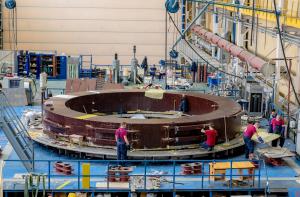Russian team completes vacuum pressure impregnation
ITER's smallest poloidal field magnet—PF1—has successfully completed one of the final stages of production, resin impregnation, at the Sredne-Nevsky Shipyard in Saint Petersburg.
Experts from the Efremov Institute (JSC NIIEFA, ROSATOM) and the Sredne-Nevsky Shipyard have successfully completed the vacuum pressure impregnation process on the coil winding pack of PF1. Acting inside of a vacuum mould and under the effect of heat, epoxy resin hardens the coil winding pack into a rigid assembly and ensures its electrical insulation. This crucial manufacturing milestone comes after a number of technological milestones were achieved last year.
Poloidal field coil #1 (PF1) is one of six poloidal field coils designed for plasma confinement in the ITER machine. Nine metres in diameter, 200 tonnes, the magnet is a complex system whose building blocks—eight double pancakes wound from niobium-titanium cable-in-conduit conductor—have been stacked and joined electrically. Just over 6 kilometres of superconductor were used during winding of PF1; this material was supplied by Russian enterprises JSC "TVEL", JSC "CHMZ", JSC "VNIINM", and JSC "VNIIKP."
Due to the first-of-a kind nature of the component and the extremely high performance and quality requirements imposed by the ITER Organization, the manufacture of PF1 required the development of advanced technologies and technological processes. The most important technologies, as well as the equipment for manufacturing, were developed at the Efremov Institute of Electrophysical Apparatus.
According to Anatoly Krasilnikov, head of the Russian Domestic Agency, it is difficult to overestimate the importance of achieving this critical stage of fabrication. "The main difficulty of impregnation was the irreversibility of the operation; it would have been impossible to alter anything in case of failure. But we had no doubts that we would succeed because a truly high-class team is working on the manufacture of the coil."
Vacuum pressure impregnation confers extremely high dielectric and mechanical strength to superconducting coils. Following its successful conclusion, PF1 will go through a number of further technological operations such as the addition of clamps, protective covers and pipes. The finished product will undergo factory acceptance tests before shipment to the ITER site in 2022.


